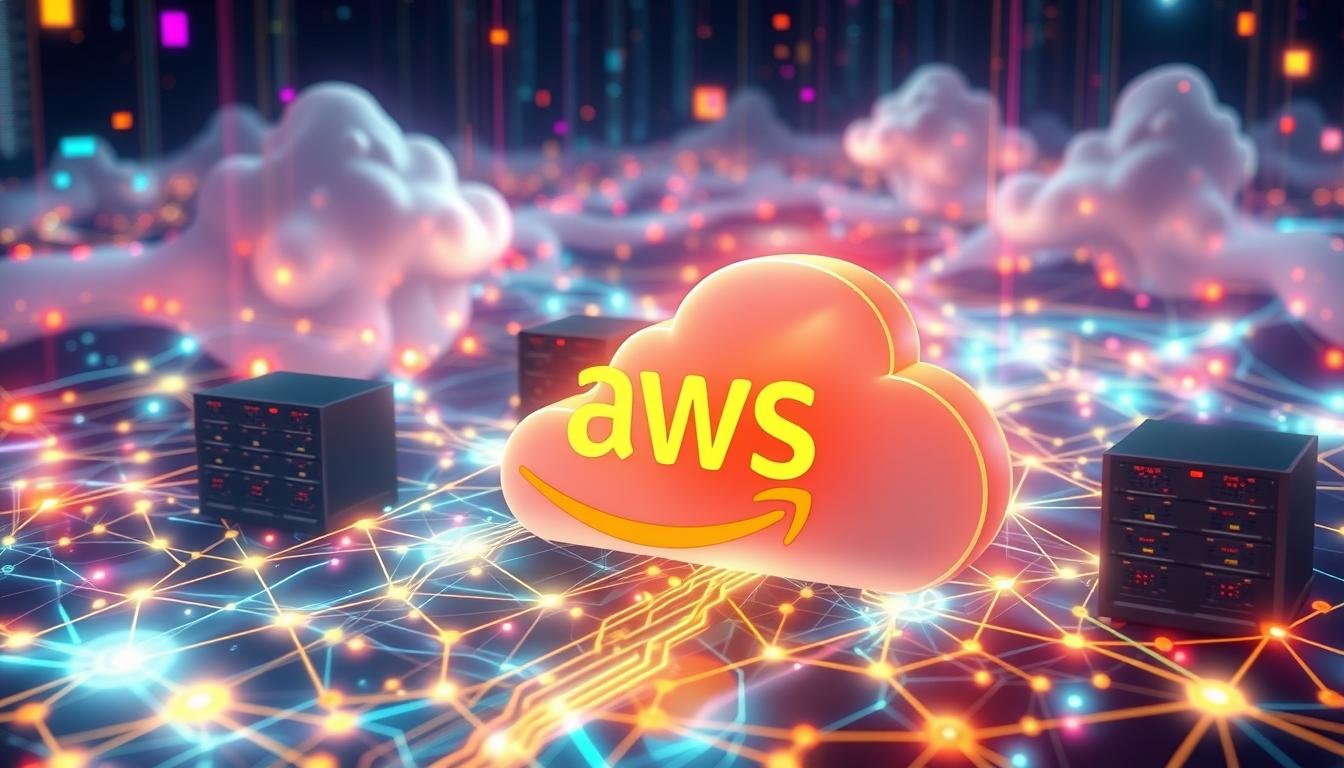Many people and businesses wonder if AWS has a VPS. Amazon AWS indeed offers cloud computing services, including virtual private servers (VPS) through EC2 and Lightsail1. AWS Cloud VPS provides scalability, flexibility, and cost savings. It’s perfect for hosting applications and services in the cloud.
To start, users can access these services via the aws console and aws login. This process ensures a secure and easy-to-use interface for managing AWS Cloud VPS resources.
Amazon Cloud Services is a leading provider of cloud services. It offers a wide range of tools and features for AWS Cloud VPS, including Amazon AWS. This platform is great for building, deploying, and managing cloud applications. With over 200 fully-featured services globally1, AWS is a robust ecosystem for businesses and individuals.
The preferred private IP ranges for AWS VPC are 10.0.0.0/8, 172.16.0.0/12, or 192.168.0.0/16. These ranges help avoid conflicts with public IPs and ensure secure internal communication2.
Key Takeaways
- AWS offers various cloud computing services, including virtual private servers (VPS) through services like EC2 and Lightsail1.
- With aws cloud vps, users can enjoy scalability, flexibility, and cost-effectiveness.
- Amazon Cloud Services provides a wide range of tools and features to support aws cloud vps.
- AWS has a presence in 32 regions and 102 availability zones worldwide1.
- Security Groups in AWS VPC operate at the instance level, whereas NACLs function at the subnet level2.
- AWS-certified professionals in India can earn salaries ranging from ₹15–30 LPA1.
Understanding AWS Cloud VPS Fundamentals
AWS cloud VPS brings many benefits, like on-demand scaling and pay-as-you-go pricing. This makes it great for both businesses and individuals3. It’s based on virtual private servers but offers more flexibility and scalability. This means users can adjust their resources easily to meet changing needs.
One big plus of AWS virtual private servers is their performance and resource allocation. With aws virtual private server, users get access to the latest tech without big upfront costs4. Plus, the vps amazon price is very competitive, starting at just $0.0059 per hour3.
The aws vps pricing model is flexible and can save money. Users only pay for what they use, which is perfect for businesses with changing needs3. This way, users can quickly adjust to demand changes without being stuck in a fixed plan.
AWS cloud VPS also offers many benefits, like better security, reliability, and performance. With a global network and a skilled team, AWS provides a strong and safe place for applications4.
AWS EC2: The Core of Cloud Computing
AWS EC2 is a flexible cloud computing service. It offers resizable compute capacity in the cloud, similar to a VPS but with more features5. It’s the heart of AWS’s compute services. Users can pick from many instance types, each suited for different tasks like CPU-heavy or memory-heavy workloads5.
One big plus of AWS EC2 is its ability to scale up or down as needed5. This is great for businesses with changing workloads or quick app deployments. Plus, EC2 instances work well with other AWS services, offering a full cloud solution5.
To start with EC2, users log into the AWS console and select from various instance types. For example, the t2.micro is free and perfect for beginners6. Amazon EBS provides fast storage, and EC2 Auto Scaling adds or removes instances automatically6. With its scalability, flexibility, and cost savings, AWS EC2 is a top choice for cloud application deployment5.
- Scalability: EC2 enables businesses to scale resources up or down based on demand5
- Flexibility: EC2 offers a wide range of instance types and configurations, allowing businesses to choose the optimal environment for their applications5
- Cost-effectiveness: EC2 is cost-effective, with companies paying only for the computing capacity they use, reducing costs and eliminating the need for heavy upfront investments in hardware5
Overall, AWS EC2 is a powerful and flexible cloud computing service. It offers scalable and cost-effective solutions for businesses in the cloud5.
Amazon Lightsail vs EC2: Making the Right Choice
Choosing between Amazon Lightsail and EC2 depends on your project’s needs. Aws lightsail is simpler and easier to use, with fixed prices and easy management7. EC2, on the other hand, is more flexible and customizable, with many options for pricing and instances8.
Aws cloud vps vs aws Lightsail is great for small to medium projects. EC2 is better for projects that need to grow and change9. Lightsail also has built-in failover for high availability. EC2 has more advanced features like ELB and Auto Scaling for even more reliability7.
Here is a comparison of the two services:
| Feature | Lightsail | EC2 |
|---|---|---|
| Pricing Model | Fixed monthly pricing | Pay-as-you-go |
| Instance Types | Limited options | Over 400 instance types |
| Scalability | Limited scalability | Highly scalable |
The choice between Amazon Lightsail and EC2 depends on your needs. If you want something simple and easy to use, Lightsail might be best8. But if you need something more flexible and advanced, EC2 is a better fit9.
AWS Lambda: Serverless Computing Alternative
AWS Lambda is a serverless, event-driven service. It lets you run code without managing servers. This is a big part of aws cloud computing and scalable cloud infrastructure. It scales automatically and charges only for what you use, making it affordable for many needs10.
With Lambda, you can write code without worrying about the infrastructure. This is a big plus of cloud hosting aws.
Choosing between AWS Lambda and EC2 depends on your app’s needs. Lambda is great for quick, event-driven tasks. EC2 is better for long tasks that need more power. About 70% of AWS users have tried serverless solutions like Lambda11.
Also, Lambda has a free tier for small apps, with 1 million requests a month. This makes it a good choice for smaller projects.
But, Lambda has some downsides. It can have slow starts and time limits. It can also get expensive for big workloads. But, you can use tricks like caching to improve it. Overall, Lambda is a strong tool for building fast, serverless apps. Its connection to other AWS services makes it a great pick for many developers10.
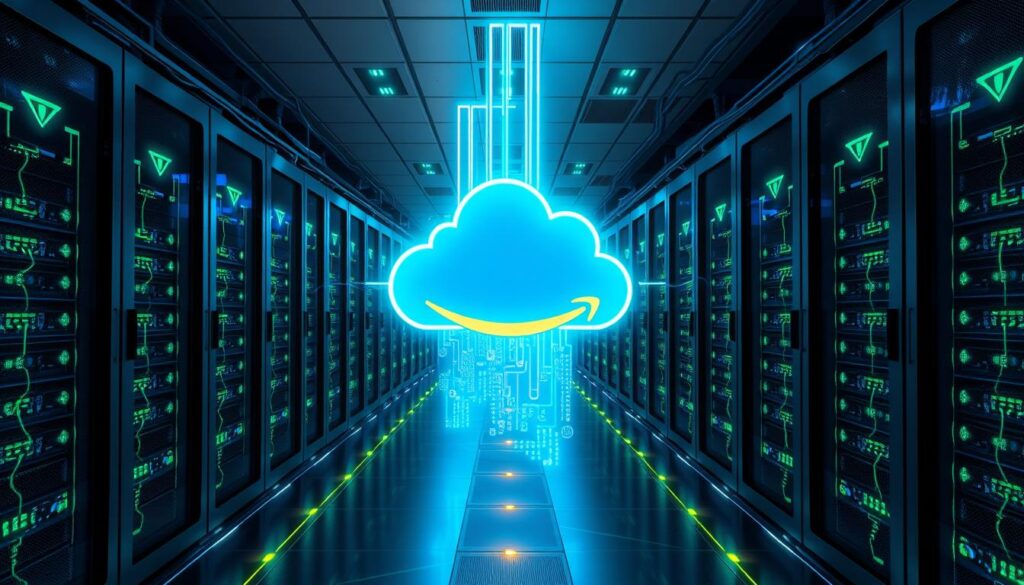
- Automatic scaling and high availability
- Pay-per-execution pricing model
- Integration with other AWS services, such as Amazon S3 and Amazon DynamoDB
Developers can make fast, scalable, and affordable apps with Lambda and AWS. This is a key part of aws cloud computing and scalable cloud infrastructure10.
Comparing AWS Cloud VPS Services
When comparing AWS VPS services, users often face a choice between EC2 and ECS. EC2 offers a variety of instance types and settings. On the other hand, ECS is known for its scalability and managed container orchestration service12. This makes ECS a great choice for those who want to manage containerized apps without the hassle of infrastructure13.
AWS has many services to meet different needs. For instance, EC2 is perfect for those who want full control over their setup. ECS, however, is better for managing containerized apps14. AWS Fargate also offers a serverless option for containers, making app deployment easier12.
Choosing the right AWS VPS service depends on your specific needs. If you need control over your infrastructure, EC2 might be the way to go. But if you’re focused on containerized apps, ECS or Fargate could be better13. The key is to match your needs with the right service.
| Service | Description |
|---|---|
| EC2 | Provides a wide range of instance types and configurations |
| ECS | Offers a highly scalable and managed container orchestration service |
| Fargate | Provides a serverless compute engine for containers |
Database Solutions: RDS vs EC2 Hosted Databases
Choosing between Amazon RDS and EC2 for aws vps hosting can be tough. Each has its own advantages and disadvantages. Amazon RDS offers automatic backups every 24 hours, ensuring your data is safe. This is great for those who need their databases to always be available.
EC2, on the other hand, gives you more control over your database. But, you’ll have to manage it yourself. EC2 can handle a lot of data and speed, making it perfect for high-performance needs. Plus, AWS has many instance types to choose from, so you can pick the best one for you.
Cost is another thing to think about. The price of Amazon RDS and AWS EC2 varies based on the instance type. You can use the AWS Cost calculator to figure it out15. RDS is usually pricier because Amazon handles the management. But, it’s worth it for the automated backups and monitoring.
So, what should you choose? If you need your database to always be up and running, and you’re okay with paying for it, go with RDS. If you want more control and are willing to manage your database yourself, EC2 is the way to go. Remember, AWS also offers Amazon Aurora, a cost-effective and efficient database service16.
| Database Service | Features | Benefits |
|---|---|---|
| Amazon RDS | Automated backups, monitoring, and scaling | High reliability and uptime, reduced management responsibility |
| EC2 Hosted Databases | More control over database, customizable instance types | High performance, cost-effective, more control over database management |
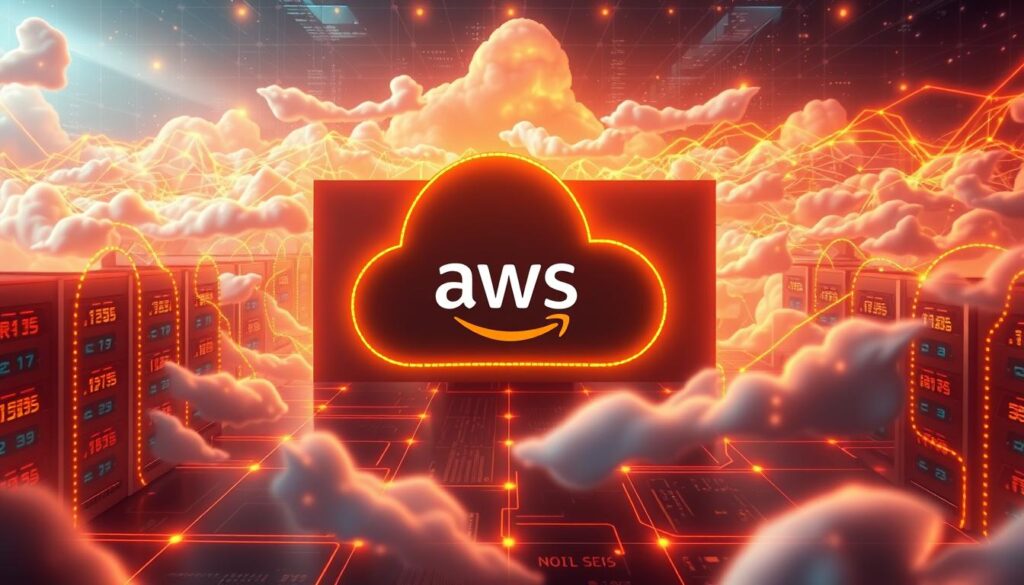
AWS Load Balancing Solutions
Load balancing is key for scalable aws vps solutions and high performance cloud hosting. AWS has different load balancing options to spread traffic across many EC2 instances. The main types are Application Load Balancer, Network Load Balancer, and Gateway Load Balancer17.
Each load balancer is for different needs. For example, the Application Load Balancer works with HTTP, HTTPS, and gRPC. The Network Load Balancer handles TCP, UDP, and TLS. The Gateway Load Balancer works at Layer 3 for gateway functions and Layer 4 for load balancing, but doesn’t support terminating flow or proxy behavior17.
Load balancers use different algorithms to distribute traffic. Static methods like round-robin and weighted round-robin don’t consider server state18. Dynamic methods like least connection and weighted least connection do consider server state before distributing traffic18.
Choosing the right load balancing solution is crucial. It ensures your aws vps performance is top-notch. Your cloud hosting environment will be both scalable and reliable. Here’s a quick summary of each load balancer’s key features:
| Load Balancer Type | Layer | Protocols |
|---|---|---|
| Application Load Balancer | 7 | HTTP, HTTPS, gRPC |
| Network Load Balancer | 4 | TCP, UDP, TLS |
| Gateway Load Balancer | 3 and 4 | Gateway functions and load balancing |
Virtual Private Cloud (VPC) Architecture
AWS VPC creates a private network in the AWS cloud. It boosts aws vps security and lets you control your network19. This is key for businesses needing top security and compliance. It works for all sizes, from small startups to big companies.
Using a VPC lets you set up your network just how you want it. You can choose IP ranges, subnets, and security groups. This makes your network fit your exact needs. Plus, it’s great for keeping resources safe and meeting strict security standards20.
Some top features of VPC include:
- Customizable IP ranges and subnets
- Security groups and network ACLs for secure access control
- Support for multiple availability zones and regions
- Integration with other AWS services, such as EC2 and RDS
AWS was the biggest cloud spender in Q3 2022, with 32% of the market20. This shows how popular AWS services, like VPC, are. Also, AWS VPC meets 98 compliance standards, more than any other cloud provider20.
For secure cloud vps solutions, AWS VPC is a top pick. It offers advanced networking options and detailed monitoring tools like flow logs20. These features are perfect for businesses needing a safe and flexible cloud setup. Plus, AWS VPC works well with over 200 services, making it great for complex applications20.
In summary, AWS VPC is a strong tool for a secure cloud setup. It has customizable settings, advanced features, and a wide range of services. It’s perfect for any business size looking for a secure aws vps or a scalable cloud environment1920.
| Feature | Description |
|---|---|
| Customizable IP ranges | Allows businesses to create a customized network architecture |
| Security groups and network ACLs | Provides secure access control and network isolation |
| Support for multiple availability zones and regions | Ensures high availability and scalability |
AWS Operating System Compatibility
Setting up an AWS VPS means choosing an operating system. AWS supports many operating systems, like Linux and Windows Server21. This choice is important for businesses and individuals moving to the cloud.
Linux fans can pick from Amazon Linux, Ubuntu, and CentOS21. Windows Server users have options like Windows Server 2022, 2019, and 201622. This variety helps find the right operating system for any need.
AWS lets users create custom Amazon Machine Images (AMIs)23. This means users can make their VPS environments fit their exact needs. With the right guide, users can manage their custom operating systems.
Choosing the right operating system is key for managing a VPS23. It ensures the VPS runs well, is secure, and reliable. AWS offers many options, helping users find the best fit for their cloud needs.
| Operating System | Supported Versions |
|---|---|
| Linux | Amazon Linux, Ubuntu, CentOS, and more21 |
| Windows Server | Windows Server 2022, 2019, 2016, and more22 |
Cost Optimization Strategies for AWS Cloud VPS
Managing aws vps cost can be done in several ways. Using Reserved Instances can save up to 75% compared to On-Demand prices24. Spot Instances offer savings of up to 90%24. AWS also has discount programs and savings plans that can cut costs significantly25.
It’s crucial to keep an eye on cloud spending. AWS tools like Cost Explorer and Budgets help with this24. These tools let businesses track expenses, find ways to save, and make smart choices about their affordable aws vps hosting and affordable aws cloud hosting.
Here are some key strategies for saving money:
- Right-sizing resources to match workload needs
- Optimizing storage by using the right type and tiered storage
- Leveraging reserved instances and spot instances
- Automating monitoring and optimization processes
By using these strategies, businesses can lower theiraws vps costand make their cloud spending more efficient26.
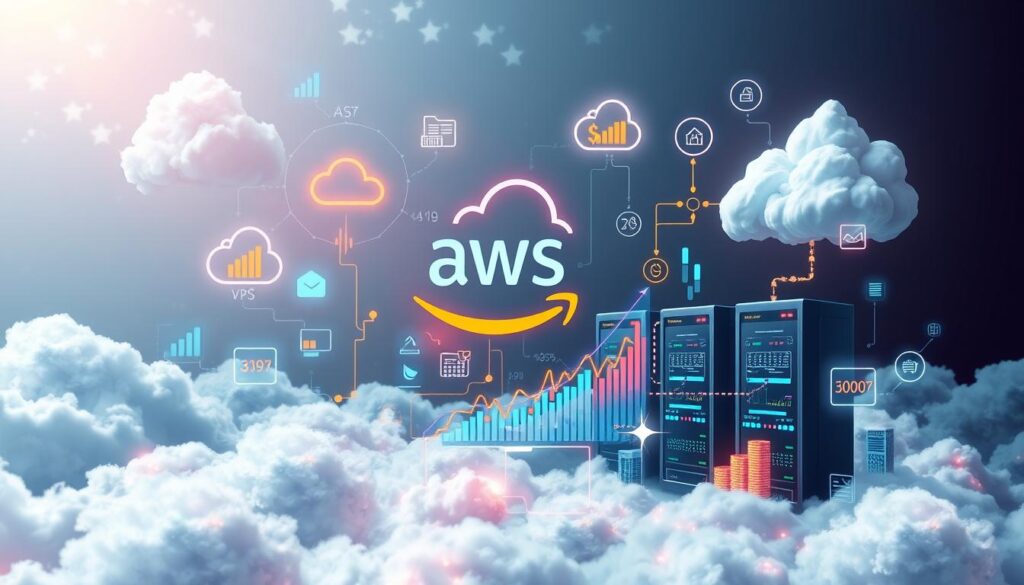
AWS CloudShell and Instance Connection Methods
AWS CloudShell and EC2 Instance Connect are key for managing AWS resources. AWS CloudShell is a browser-based shell for managing AWS resources. EC2 Instance Connect lets you connect to EC2 instances with short-lived SSH keys27. Knowing the difference between these services is vital for secure and efficient management of aws vps security.
A secure aws vps needs careful access management and security best practices. This includes using key pairs, security groups, and IAM roles to control access. The concept of least privilege access is also key, ensuring users and services have only the necessary permissions. An aws cloud administrator should know these best practices to keep AWS resources secure and intact.
AWS CloudShell offers up to 1 GB of persistent storage in each AWS Region at no extra cost. It also has customizable features like screen layouts and interface themes28. Plus, it comes with a range of pre-installed development tools and utilities. By using these features and following security best practices, users can have a secure and efficient experience with their aws vps security.
For more details on AWS CloudShell and EC2 Instance Connect, check the official AWS documentation and resources27. This will help users understand these services better and how to use them to improve their aws vps security and overall AWS experience.
AWS Elastic Beanstalk vs Lightsail
Choosing an aws vps solution can be tricky. AWS Elastic Beanstalk and Lightsail are two top choices. Elastic Beanstalk is a PaaS that supports many platforms like Java, PHP, and Node.js29. Lightsail, on the other hand, offers simple VPS hosting with templates for WordPress, Drupal, and Joomla29!.
When it comes to aws cloud hosting, Elastic Beanstalk uses EC2 Autoscaling for scaling. Lightsail doesn’t have autoscaling and needs manual app additions29. Lightsail is great for small apps because it’s easy to use and affordable30. Elastic Beanstalk, while more expensive, includes a load balancer and other services30.
Looking at managed aws hosting, each service has its pros and cons. Amazon LightSail is cheap and easy to set up, while AWS Elastic Beanstalk integrates well with other AWS services31. However, Elastic Beanstalk has extra costs and can be complex31. The right choice depends on your app’s needs.
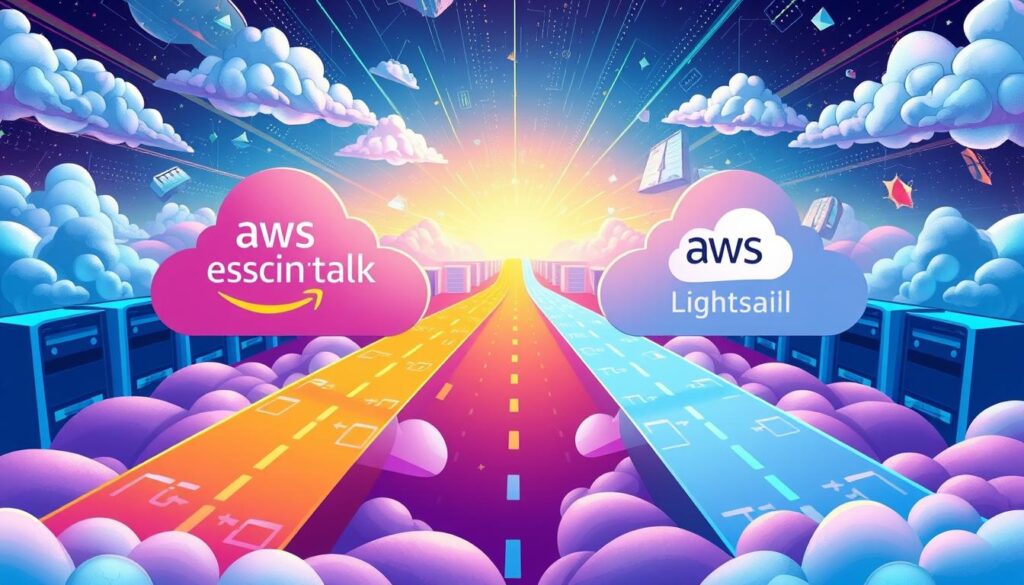
AWS vs Azure: Cloud Platform Comparison
Amazon Web Services (AWS) and Microsoft Azure are top names in cloud computing. They both offer best cloud vps and top cloud vps hosting services. The cloud computing market is expected to grow to $2432.87 billion by 203032.
AWS leads with a 32% market share in Q1 202332. Microsoft Azure follows with 23% in Q1 202332.
Both AWS and Azure provide many services like compute, storage, and databases. But, their pricing is different. AWS has various instance types with different prices32. Azure uses a pay-as-you-go model and also offers Reserved VM Instances for savings32.
When choosing between AWS and Azure, think about your needs. Consider your existing Microsoft setup, specific service needs, and where you need services.
AWS has over 200 data centers worldwide32. Azure offers services in more regions than AWS and Google Cloud32. Azure is the cheapest for storage pricing among AWS, Azure, Google Cloud, and Oracle33. AWS, Azure, and Google Cloud all support per-second billing for some services33.
The choice between AWS and Azure depends on your needs. Look at service offerings, pricing, and global reach. The right cloud platform will help your business thrive in cloud computing and benefit from best cloud vps and top cloud vps hosting34.
Conclusion
This final section highlights why AWS cloud VPS is a top pick. We’ve looked at its strong features and why it’s a leader in virtual private servers.
AWS cloud VPS is known for its scalability. You can easily change resources as your needs grow35. It also has 25 regions, 80 availability zones, and 13 wavelength zones. This means your apps will run fast and smoothly, no matter where your users are35.
The pricing is also a big plus. You only pay for what you use, making it a cost-effective choice36.
AWS cloud VPS also has top-notch security. It includes firewalls, encryption, and regular backups to keep your data safe36. With services like EC2, Lightsail, Lambda, and more, you can customize your cloud setup to fit your business needs.
Looking to host a website or run critical apps? AWS cloud VPS is a reliable choice. It’s known for its innovation and global reach, making it the best option for scalable cloud VPS35.
